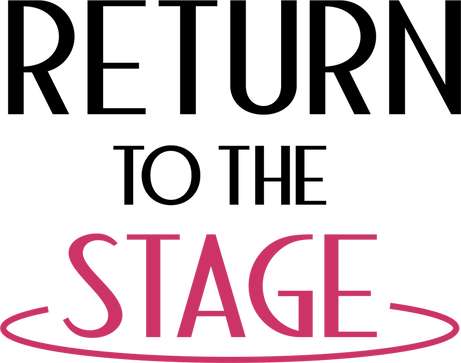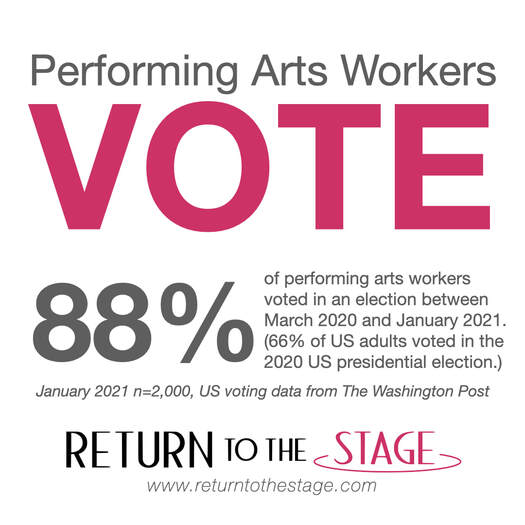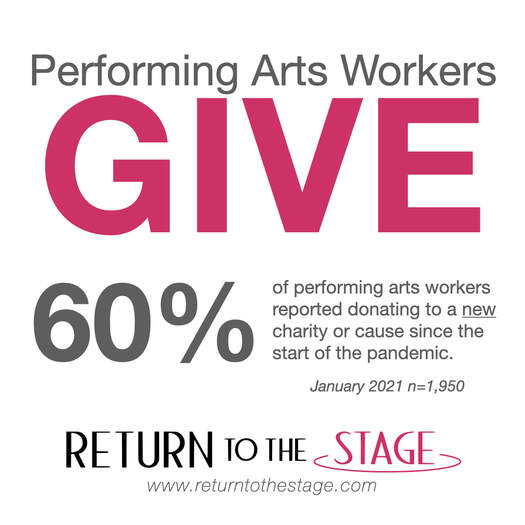PurposeUnderstand the Performing Arts Workforce
|
RETURN TO THE STAGE is a longitudinal study of performing arts workers in the United States, designed to understand COVID-19 related impacts and to begin documenting a broad future vision for the field.
|
Learn More about the July 2021 Report:
Tuesday, September 14, 3:00 EDT Session sponsored by the Association of Performing Arts Professionals Free Registration Monday, September 20, 2:15 pm Central Arts Midwest Annual Conference: People First Conference registration required Tuesday, October 12, 3:00 pm EDT AMS Analytics - Reimagining Return series Free Registration in October |
Why are you doing this?
The workforce is the lifeblood of the performing arts sector. Without the talent and effort of thousands - paid and unpaid - the brilliance of live performance would not be able to happen. Performing arts workers are also uniquely resilient and creative, accustomed to working as a team on tight deadlines, often in rapidly changing conditions. This survey will help us understand how the performing arts workforce is experiencing the effects of COVID-19 related restrictions, what kinds of coping strategies the workforce is using, and what your hopes are for the performing arts field in the months and years to come.
This is important because, even as the number of jobs changes in response to sudden losses in revenue, understanding the other side of the equation is just as important: the people side. Lost jobs does NOT equate to lost talent, and we want to hear from the full array of talented people so a clear(er) picture can be formed of the performing arts sector’s future.
Who should take it?
Everyone who works or volunteers in the performing arts: Performers and managers, directors and choreographers, front-of-house folx and box office teams, writers, technical and design folx, development and marketing, facility operators, vendors, and everyone else who makes the work happen. Your input is anonymous, and individual data will never be shared.
If you would like to receive reports and updates, please join the mailing list.
The workforce is the lifeblood of the performing arts sector. Without the talent and effort of thousands - paid and unpaid - the brilliance of live performance would not be able to happen. Performing arts workers are also uniquely resilient and creative, accustomed to working as a team on tight deadlines, often in rapidly changing conditions. This survey will help us understand how the performing arts workforce is experiencing the effects of COVID-19 related restrictions, what kinds of coping strategies the workforce is using, and what your hopes are for the performing arts field in the months and years to come.
This is important because, even as the number of jobs changes in response to sudden losses in revenue, understanding the other side of the equation is just as important: the people side. Lost jobs does NOT equate to lost talent, and we want to hear from the full array of talented people so a clear(er) picture can be formed of the performing arts sector’s future.
Who should take it?
Everyone who works or volunteers in the performing arts: Performers and managers, directors and choreographers, front-of-house folx and box office teams, writers, technical and design folx, development and marketing, facility operators, vendors, and everyone else who makes the work happen. Your input is anonymous, and individual data will never be shared.
If you would like to receive reports and updates, please join the mailing list.
Study Authors |
|
Meg Friedman
Meg is a consultant and former stage manager with over 20 years' experience in the performing arts. She has stage managed performances in 30+ states, conducted original research into theater volunteerism, and as a consultant has supported strategic planning and feasibility studies for arts organizations across North America. Meg is a member of Actors' Equity. Read more on LinkedIn. |
David J. McGraw
David is the Program Coordinator for Arts Administration at Elon University and has worked in the performing arts for several decades. He recently worked with the South African State Theatre on a Fulbright Specialist Grant. He is also the creator of the Stage Manager Survey and the SACITS Study. Full bio. |
Share |

This work is licensed under a Creative Commons Attribution-NonCommercial-NoDerivatives 4.0 International License.
Meg Friedman and David McGraw hold the copyright to this study. You have the permission of the copyright holders to share or post these reports for noncommercial use as long as you provide a link to http://returntothestage.com. If you wish to use any portion of this report for commercial use, please contact the authors.
RETURN TO THE STAGE is an independent study. The authors are not in receipt of funding from any agency or organization.
This website is property of SM-Sim, LLC, which is solely owned and operated by David J. McGraw, creator of the Stage Manager Survey.
A note of thanks...
This study was approved by the Elon University Institutional Review Board in June 2020 and December 2020. Elon University also provided access to the Qualtrics software used to create, distribute, and analyze the survey.
RETURN TO THE STAGE is an independent study. The authors are not in receipt of funding from any agency or organization.
This website is property of SM-Sim, LLC, which is solely owned and operated by David J. McGraw, creator of the Stage Manager Survey.
A note of thanks...
This study was approved by the Elon University Institutional Review Board in June 2020 and December 2020. Elon University also provided access to the Qualtrics software used to create, distribute, and analyze the survey.


